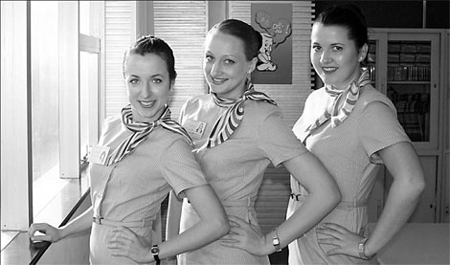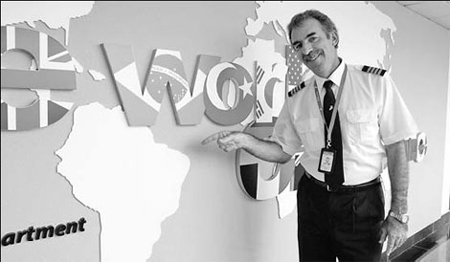The sky's the limit
 |
|
Katya Ganich (left) with her colleagues at Hainan Airlines. Photos provided to China Daily |
 |
|
Brazilian Lotario Kieling flies Shenzhen Airlines' Boeing 737s and manages its foreign pilot subsection, which is seeking more foreign pilots. |
Chinese airline companies are increasingly recruiting pilots and flight attendants as the industry experiences rapid expansion.
Like an increasing number of foreigners, Katya Ganich is seeking her fortune in China. After graduating from university and training for four months as a flight attendant, the 22-year-old from Vladivostok, Russia, is looking forward to receiving her "crew pass" so she can start flying with Hainan Airlines.
"I want to start flying as soon as possible," says Ganich, who has strikingly crystalline, gray eyes. "And I want to see how it goes, if this job is for me or not."
Before moving to Shanghai in the fall of 2008 for her final year at university, she worked that summer as a resort animator in Sharm El Sheikh, Egypt. The year prior to that she spent three months as a housekeeper in Alaska's Denali National Park, on a student work and travel program.
"It helped me to realize that I'm interested in a job in the hospitality industry," she says. "It was also good experience for me to go to other countries and meet people from different places."
Ganich is among the latest intake of Hainan Airline's 100 foreign employees, which include Hungarians, Americans, South Koreans, an Australian and a Tanzanian. They represent just 1 percent of the company's staff but offer skills essential to an airline that recently received the coveted international five-star rating from industry research firm Skytrax.
"We now have more foreign destinations and it's good if we have flight attendants from those countries," says Gao Shujin, a flight attendant and cabin crew trainer with Hainan Airlines for 15 years. "Our passengers feel more at ease if there's someone from their own country serving them It also shows China's development in the industry."
Opportunities for foreign talents are increasing with the expansion of the Chinese civil aviation industry.
To increase transport capacity, China in the next five years plans to add 56 more airports to its existing 175, civil aviation officials say. Meanwhile, Boeing, the world's largest commercial aircraft manufacturer, forecasts that the country will need 4,330 new commercial airplanes over the next 20 years.
Beijing Capital International Airport is already the world's second busiest airport, in passenger numbers, handling 73.9 million travelers in 2010 - after Hartsfield-Jackson in Atlanta. The Airports Council International put three more Chinese airports in the top 20 of the same list, reporting Hong Kong, Guangzhou and Shanghai had combined passenger traffic of 132 million in 2010.
Lotario Kieling knows only too well the crucial skills required to assist the mass transport of people. The Brazilian pilot, who flies Shenzhen Airlines' Boeing 737s and manages its foreign pilot subsection, is on a mission to find 50 more foreign pilots to augment the company's current roster of 110.
"China is going to receive 2,400 airplanes in the next five years," says Kieling, who has been a licensed pilot for 38 of his 56 years.
"This means around 450 airplanes every year. That's around 1.5 airplanes per day. And every two days If it's a domestic flight, three airplanes need 15 captains and 15 first officers," he says, explaining the need for more flight personnel.
China is producing its own pilots, but wisdom and experience is not something that can be taught at flying school, he adds. For now, it appears the key is to find talent overseas.
"Today, money is not a problem in China," says Kieling, who moved from Sao Paolo to Shenzhen in 2004 and is married with three daughters. "The salary in China is exactly the same as in the international market, but the cost of living here is lower."
On top of that, Kieling says the country offers every sort of lifestyle under its skies. "If the guy likes cold weather, he can choose a company in Beijing. If he likes warm weather, he can go to Shenzhen. If he wants to live in a small town, he can live in Macao If he wants a big city with many things, he can choose Hong Kong or Shanghai."


















